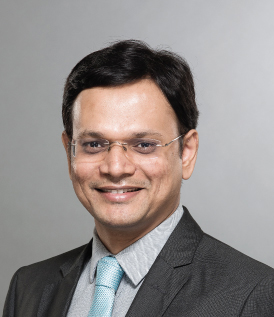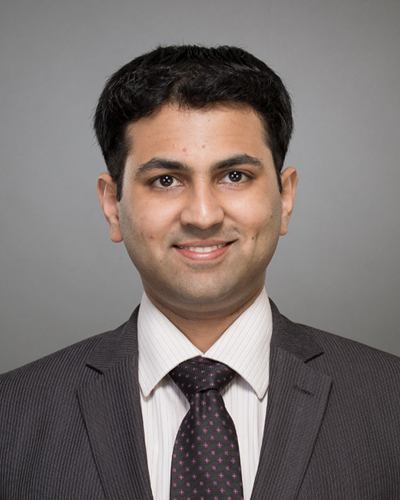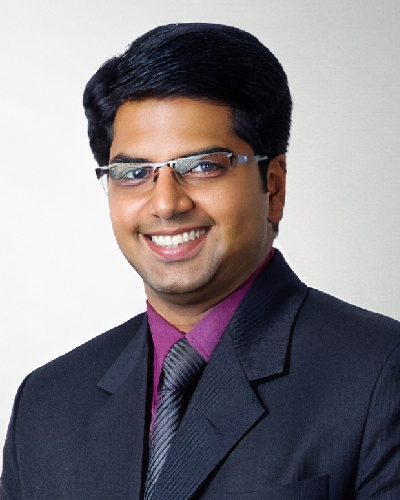At Aster Hospitals Bangalore, our doctors are specialized in advanced Minimally Invasive Spine Surgery treatments. With small incisions, less blood loss, quicker recovery and less pain medications - Aster’s Spine Centre employs the latest innovations and technologies, including pre-surgery planning software and intra-operative neuromonitoring. No more trauma of open surgery. Get back your strong back sooner.
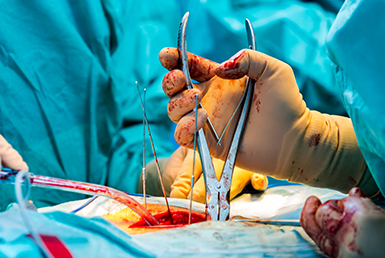
TRADITIONAL SPINE SURGERY
Traditional methods of spine surgery, or ‘open procedures’ require long incisions down the middle of the back and stripping of muscles and ligamentous attachments to the spine. Moreover, the muscles are pulled and held apart to grant a surgeon access to the spine for the surgery duration. This can range from one hour to several hours. The invasive and traumatic nature of open spine surgery, compromises the vital supporting structures of the spine that play an important role in maintaining the strength and flexibility of your back.
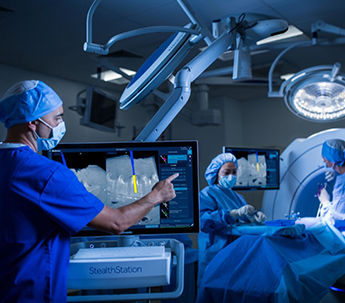
MISS METHOD
A more recent method of performing spine surgery is called ‘minimally invasive spine surgery’ (MISS). Minimally invasive spine surgery techniques are far better for a patient because they aim to address the root cause of your spinal problem safely and completely, without disturbing the spine’s natural supporting structures.
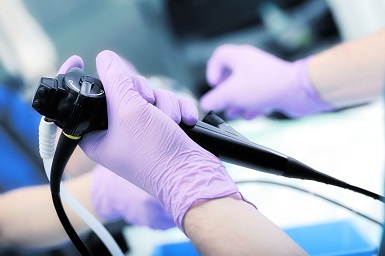
ENDOSCOPIC SPINE SURGERY
Aster Hospitals offer Endoscopic Spine Surgery, an advanced form of Minimal Invasive Surgery through a small incision with an endoscopic fibre optic tube with camera. The procedure, which comprises moving and not cutting muscles, involves less blood loss, pain and trauma, gets you mobile in a day's time. Endoscopic Spine Surgery is usually recommended for conditions such as Slipped disc, Narrowing of spinal canal, Refractory back pain or Spinal infection.
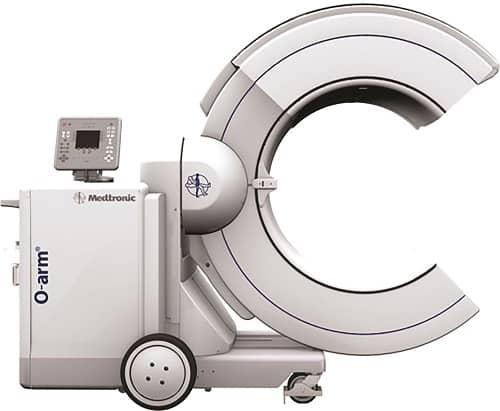
ADVANCED TECHNOLOGIES
Optimal results are achieved through the right blend of latest innovations and technologies, such as intra-operative neuromonitoring, neuronavigation, microscopic guidance and O-arm TM system.
OUR DOCTORS
Dr. Umesh Srikantha
Consultant - Neurosurgery, Head of Spine Services
MBBS, M.Ch (Neurosurgery), FMISS
Dr. Umesh Srikantha, is a highly acclaimed spine surgeon working as a Consultant and Head of spine services at Aster CMI & Aster RV Hospitals. His areas of special interest are Minimally Invasive Spine Surgery (MISS), Endoscopic Spine surgery, complex spine surgery, Stereotactic and Functional Neurosurgery and Neuro-oncology.
He completed his MBBS from Karnataka Institute of Medical Sciences, Hubli, Karnataka, followed by M.Ch training in Neurosurgery from the prestigious National Institute of Mental Health and Neurosciences (NIMHANS), Bangalore, Karnataka where he received the silver jubilee award for best outgoing student.
After working as a general neurosurgeon for a few years, he developed an active interest in the field of spine surgery and further pursued his training by doing a Fellowship in Minimally Invasive Spine Surgery from Nanoori Hospital, South Korea with Dr. S Lee.
He is also trained in stereotactic and functional neurosurgery, and neuro-oncology And has been a part of several research projects on brain tumours.
He has a rich experience of performing close to 2000 Minimally Invasive spine procedures with an overall experience of more than 4500 procedures in brain and spine. His experience in MISS ranges from basic procedures like micro lumbar discectomy, foraminotomy and decompression surgeries to the most complex spinal fusion procedures for advanced pathologies like tumors, multi-level cervical spondylotic myelopathy, and high-grade spondylolisthesis. He is one of the top surgeon faculties in the country for MISS, having trained more than 100 aspiring surgeons to adopt MISS through more than 40 advanced training programs of different formats. He has also presented his advanced MISS cases at a number of conferences.
An ever enthusiastic professional, he has participated in various training programs and workshops and has several publications in peer-reviewed journals to his credit.
- Silver Medal for the best outgoing student from NIMHANS.
- Pioneering cadaver work on minimally invasive spine surgery for the cervical spine and craniovertebral junction, which has been successfully applied into clinical practice.
- Invited faculty for several workshops and conferences on minimally invasive spine surgery.
- Conducted several cadaveric hands-on training courses and trained more than 100 surgeons from all over the country on minimally invasive spine surgery.
- More than 20 publications in renowned national and international journals and authored chapters on Minimally Invasive Spine Surgery.
Dr. Akshay Hari
Consultant – Neuro Surgery and Spine Surgery
MBBS, DNB (Neurosurgery), Fellowship in Minimally Invasive & Advanced Complex Spine
Dr. Akshay Hari is a highly qualified neurosurgeon and spine surgeon, working as Consultant of Neurosciences at Aster CMI & Aster RV Hospitals, with the goal of providing the best quality neurological service for patients. He has a wide experience in Minimally Invasive Brain and Spine Surgeries, Micro-Neurosurgery...
Critical Care Management of Head and Spine Injuries, Brain Tumors, and Spinal Deformities. He has also worked with other private hospitals in India and abroad and has handled a variety of responsibilities. He completed his post-graduate super-speciality training in neurosurgery (Diplomate of National Board - DNB) and under-graduate primary medical training (MBBS) from the Rajiv Gandhi University of Health Sciences, Bangalore.
During his training years, Dr Akshay has accumulated a wealth of national and international accolades including high honours in Neurosurgery from the Massachusetts General Hospital, Boston, USA (affiliated to Harvard Medical School) and was a visiting Neurosurgical trainee at the University of Groningen, Netherlands. He was also awarded the prestigious AO Spine fellowship, along with an AO Spine Research grant for his pioneering work on the use of ultrasound in reducing radiation during spine surgery. He was granted the first-ever joint NSI-CNS travelling fellowship and was chosen to be selected for the esteemed “Ambassadorship” student exchange program under the a egis of the American Association of South Asian Neurosurgeons (AASAN) at the University of California, San Francisco, USA.
Having travelled the world, receiving training and expertise in some of the best neurosurgical centres in the USA and Europe, Dr Akshay derives experience in a diverse range of areas in the brain and spinal surgery. He went on to pursue a highly competitive spinal fellowship, obtaining subspecialty training and expertise in the treatment of complex spinal surgery, including robotic spinal surgery and minimally invasive spinal surgery at The Royal Melbourne Hospital, Melbourne, Australia.
Dr. Akshay Hari operates on a high volume of referral and non-referral patients, performing up to 30 operations per month to address various neurosurgical and complex spinal pathologies including deformities, trauma, degenerative conditions and tumours apart from the peripheral nerve, general neurosurgery and procedures for pain. He implements a range of time-tested and novel procedures, treatments and therapies, including advanced minimally invasive techniques. He conducts special outreach camps and programs at the community level to spread awareness about spinal health and illnesses. He has organized various CME’s and workshops including cadaveric courses and hands-on training programs for Minimally Invasive spine surgery and is deeply involved in academic research.
He is skilled in performing clinical research and stays abreast of new technologies in the field. He is resourceful and has an open mind to exploring alternative treatment options to provide patients with the best possible health outcomes and is eager to apply these skills in daily practice.
Dr. Yadhu K Lokanath
Consultant - Neurosurgery & Spine Surgeon
MBBS, MS (General surgery), MCh (Neurosurgery), Fellowship in Minimally Invasive & Endoscopic Spine Surgery
Dr. Yadhu K Lokanath is a well-qualified Neurosurgeon and Spine Surgeon currently working at Aster CMI & Aster RV Hospital as a Consultant in Spine Surgery with a special interest in the keyhole or minimally invasive spine surgery.
He is a very compassionate surgeon with the goal to hear patient’s concerns and achieve optimal outcomes for his patients Earlier he was associated with Aster CMI Hospital as a Senior Specialist in the Department of Neurosurgery - Center of excellence for Brain and Spine before joining Aster RV Hospital. His key area of interest is the treatment of spinal conditions from pediatric to geriatric population.
He has dedicated his career to the treatment of spinal disorders with lateral access surgery, minimally invasive and endoscopic spine surgery being his clinical area of interest. He completed his MBBS in 2009 from J.J.M Medical college followed by a post-graduation in General surgery from J.J.M Medical College, Davanagere.
He finished his super specialty MCh training in Neurosurgery from J.N Medical College, Belagavi, Karnataka. In 2016 he joined Aster CMI, hospital where he developed a special interest in the management of spinal disorders He underwent advanced training and finished his fellowship in Minimally invasive and Endoscopic spine surgery from Seoul St Mary’s Hospital.
He pursued his further training in percutaneous endoscopic spinal surgery as an international visiting surgeon at St Peter’s Hospital, Seoul, Korea. He has certification from the Karnataka Medical council with Reg. No 85104.
He has attended various programs, published several scientific papers and articles, and also has made presentations on the management of spinal disorders in academic circles.
With years of experience, he strives to ensure the best possible result for each patient he treats he is prominently known as the Best Spine Doctor in JP Nagar, Bangalore.
Endoscopic Spine Surgery (ESS) is a procedure performed through small incision with help of tubular system assisted with endoscope to visualize the surgical field. ESS is an advanced form of Minimal Invasive Surgery aimed at providing lesser recovery time, early return to work and less post-operative pain than traditional spine surgery methods with improved visualisation.
This procedure is performed with a fibre optic tube with light and lens. Through this the muscles are not cut but are pushed aside to permit small tube to enter the spine and a very small high-definition camera is used to see the spine anatomy.
- Target oriented surgery - less trauma muscle and soft tissue
- Minimal bone removal - Spinal stability is preserved
- Less blood loss
- Lesser infection rates
- Reduced requirement of post - operative analgesia
- Through this the patients are mobilised and can be discharge the same day with proper post-operative instructions.
- ESS procedure can be performed using regional or local anaesthesia instead of general anaesthesia, decreasing the risk of general anaesthesia in elderly patients or patients with co-existing medical conditions.
Our spine is nature’s extraordinary miracle. Several complex structures come together to provide the human body with a fine balance of protection, support, strength and movement. A healthy spine is not just the bony segments but a combination of several ‘supporting structures’ - protective discs, strong muscles and attached ligaments and tendons. The 24 bony segments or vertebral bodies or vertebrae in the spine are interspersed with a tough, yet soft gel-like cushion or shock-absorber, called intervertebral disc. The muscles surrounding the spine or ‘para-spinal muscles’ are attached to the bones through ligaments. Together these structures, called the ‘natural tension band’ provide mobility, strength and protection to the back. The core of our spine’s movement, structure and flexibility comes from complex biomechanics of the bony vertebrae and supporting structures. Often compared to a ‘crane’, it is said that for the spine to be stable, all elements must be intact and function in unison.
Pain that just doesn’t go away can be frustrating and agonizing. If you have been suffering from unresolved back pain despite medication, physiotherapy, and other pain-relieving treatment, please be assured that you are not alone. Chronic back pain is more common than you would imagine. In fact, it has been noted that as many as 60% Indians cope with significant back pain, some or the other time in their lives. The most common cause of chronic back pain is age related degeneration of the spinal discs. Though aging is a natural process, in some individuals it may lead to unmanageable and incessant pain. The pain may or may not be accompanied by numbness, weakness and stiffness. Another common cause of severe back pain is stress or sports injury. For example, sudden surge in activity or lifting heavy loads can sometimes lead to spinal complications beyond a simple muscle spasm. In most cases, root cause of pain and weakness is some pressure or impingement on highly sensitive structures like spinal cord or nerves, due to:
- excess bony growth (osteophytes)
- damage to the disc leading to displacement of the inner core (herniated disc)
- drying up of the discs leading to reduction in the opening between two adjacent vertebrae
- dislocation of the spinal joints (spondylolisthesis)
- fractures due to osteoporosis
Visiting a spine surgeon does not mean you will need spine surgery! A specialist can understand and interpret the root cause of your back pain through some simple tests like X-rays, MRI or CT Scans. Also a spine specialist has comprehensive training and experience to understand spinal anatomy, correlate symptoms to pathology, and recommend and offer surgical or non-surgical treatment options. This makes them much better-equipped to manage your spinal issues effectively.
Traditional methods of spine surgery, or ‘open procedures’ require long incisions down the middle of the back and stripping of muscles and ligamentous attachments to the spine. Moreover, the muscles are pulled and held apart to grant a surgeon access to the spine for the surgery duration. This can range from one hour to several hours. The invasive and traumatic nature of open spine surgery, compromises the vital supporting structures of the spine that play an important role in maintaining the strength and flexibility of your back. This method of surgery will address a surgeon’s operative goal, i.e. relieving the pressed nerve or spinal cord. However, it compromises on the natural anatomy and exposes the patient to weakness of the back post-surgery leading to compromised muscle strength and flexibility, and pain.
- Disc prolapse (slipped disc)
- Spinal Canal Stenosis (Cervical and lumbar – narrowing of spinal canal)
- Refractory back pain
- Spinal infection – for biopsy and debridement
- Intralaminar technique - performed from the back of the spine between two laminae
- Transforaminal technique - performed from the / side of the spine (flank) into the neuroforamen(exit passage for the nerve )
A healthy back is a combination of healthy bones, mobile joints, and strong muscles. Unfortunately, a complex system like our back or spine is prone to issues arising from one or more malfunctioning elements. Any disturbance to the spine and it’s supporting structures due to aging, trauma, lifestyle stresses or other pathologies can lead to spinal complications, most commonly appearing as back or neck pain. Maintaining a healthy spine is almost non-negotiable to ensure a healthy, pain-free and active life. Simple activities such as maintaining healthy posture, regular exercise, good nutrition and regular exposure to the sun, go a long way in maintaining a healthy spine.
Managing your back pain is all about taking timely action. See a trained physician about your condition if pain persists for more than a week of home treatment and rest. Depending upon their assessment of your condition, a physician may advise you one or more of the following:
- Physical therapy including exercises and other treatments like heat, ultrasound, electrical stimulation to ease the pain and strengthen the back
- Anti-inflammatory or pain medication
- Epidural spinal injections to manage the pain supporting other treatment modalities
- Lifestyle modification
A spine specialist may diagnose you as a candidate for surgery if they feel that your problem is advanced. The nature of the spine is such that degeneration or damage to one part can trigger a cascade which can start affecting other healthy parts as well. Therefore, a surgeon may suggest that in certain cases, surgery may be the right option for you. Spine surgery has been around for several decades and has evolved into a very safe procedure. Surgeons have the dual advantage of rigorous training and advanced technologies that ensure safe and satisfying outcomes. A large number of patients are known to have benefitted after spine surgery performed for conditions such as lumbar spinal stenosis, degenerative disc disease, disc herniation. Talk to your surgeon openly about your concerns!
Since MISS is technically challenging, enough care is taken on different aspects to ensure a safe and good outcome. It is important for you, as a patient considering MISS, that your surgeon is well-trained, and has enough experience of performing a wide range of spine key-hole surgeries. In addition, the hospital staff and infrastructure should also support performing these Minimally Invasive Procedures with accuracy, precision and safety. MISS is a way of life at Aster. More than 90% of the spinal surgeries here are done through minimally invasive techniques. Aster is probably the only hospital that ‘regularly’ does MISS for cervical pathologies and complex spine cases.
Clinical Expertise:
Dr. Umesh Srikantha, Head of Spine Services at Aster, has performed close to 2000 minimally invasive spine surgeries in the past seven years. His experience in MISS ranges from the most basic procedures like lumbar microdiscectomy, foraminotomy and decompression surgeries to the most complex spinal fusion procedures for advanced pathologies like tumors and high-grade spondylolisthesis. He is one of the top surgeon faculties in the country for MISS, having trained more than a hundred aspiring surgeons to adopt MISS through advanced training programs. The OR team at Aster has also been supporting MISS for the past seven years and is proficient with the use of complex MISS instrumentation and high-end technologies such as navigation and neuro-monitoring.
Technology:
We all know how the advent of data connectivity, GPS and Google Maps, has simplified road travel for the common man. We rarely feel the need to stop and to ask for directions. More importantly, we are able to reach the correct destination in the shortest possible time. Similarly, modern and state-of-the-art hospitals invest in and routinely use surgical navigation technologies. The use of surgical navigation systems along with advanced pre-surgery planning software has revolutionized a surgeon’s ability to visualize the anatomy in 3D and perform more accurate surgeries even through smaller skin incisions and narrow tubes. In addition, the use of intra-operative neuro monitoring ensures critical nerve structures are monitored and protected through the course of Spine surgery. At Aster, these advanced enabling technologies are used routinely to ensure MISS is performed with utmost accuracy, precision and safety.
WHY ASTER?
We all know how the advent of data connectivity, GPS and Google Maps, has simplified road travel for the common man. We rarely feel the need to stop and to ask for directions. More importantly, we are able to reach the correct destination in the shortest possible time. Similarly, modern and state-of- the-art hospitals invest in and routinely use surgical navigation technologies. The use of surgical navigation systems along with advanced pre-surgery planning software has revolutionized a surgeon’s ability to visualize the anatomy in 3D and perform more accurate surgeries even through smaller skin incisions and narrow tubes. In addition, the use of intra-operative neuro monitoring ensures critical nerve structures are monitored and protected through the course of Spine surgery. At Aster, these advanced enabling technologies are used routinely to ensure MISS is performed with utmost accuracy, precision and safety.
Testimonials


